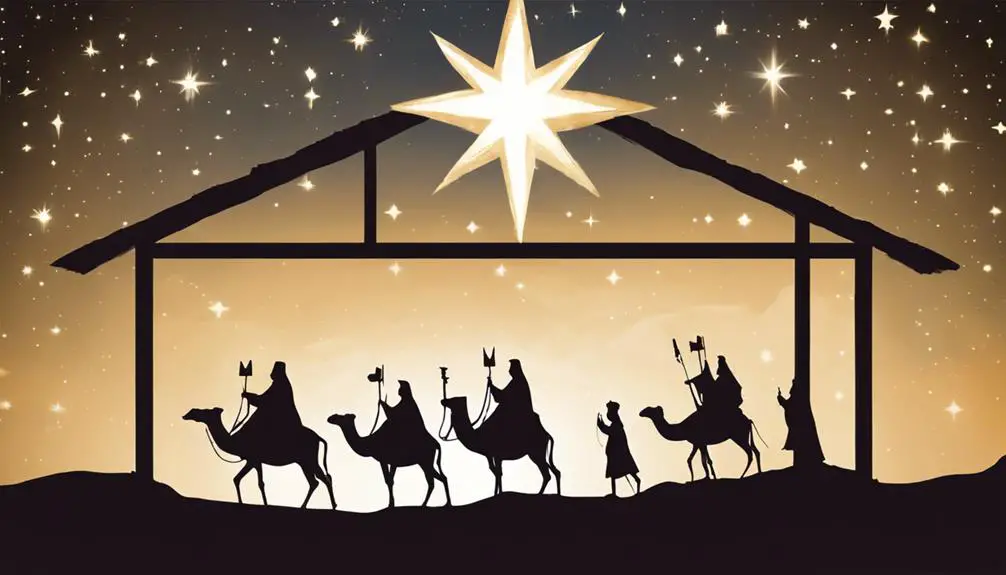Kneel in reverence as we delve into the profound historic and spiritual depths of a famed Bible verse about Jesus's birth.

A Bible Verse About the Birth of Jesus
Peeling back the layers of the Bible's narrative is like unlocking a treasure chest of spiritual wisdom.
You've probably read the verse in Luke 2:11, 'For unto you is born this day in the city of David a Savior, who is Christ the Lord.'
Yet, do you ever wonder about the deeper meaning behind these words? What historical and cultural context do they carry? How might they resonate with us in our contemporary world?
We're about to embark on an exploration that might just change the way you perceive this well-known verse.
Key Takeaways
- Luke 2:11 is a significant Bible verse announcing Jesus's birth, emphasizing His divine authority and Messiahship.
- The verse reflects the historical context of the Roman Empire and Jewish expectations for a savior.
- Theologically, it affirms the Incarnation concept and Jesus's universal impact as the deliverer.
- Today, the verse remains relevant, promoting hope, unity, and divine salvation in society.
Unveiling the Bible Verse

Delving into the rich tapestry of the Bible, let's unveil the verse that beautifully encapsulates the birth of Jesus Christ, dissecting its profound symbolism and contextual relevance. The verse in question is Luke 2:11, which proclaims, 'For unto you is born this day in the city of David a Savior, which is Christ the Lord.'
Let's start with the phrase 'unto you is born this day.' This line emphasizes the immediacy and personal significance of Christ's birth. It's not just a historical event; it's a transformative occurrence that directly impacts you. The phrase 'in the city of David' links Jesus to the lineage of King David, a figure revered in Jewish tradition, reinforcing Jesus's rightful claim to the throne and His messianic role.
Now, focus on 'a Savior, which is Christ the Lord.' Here, the verse unequivocally identifies Jesus as the long-anticipated Messiah, the Savior of mankind. The title 'Lord' further establishes His divine authority and supreme power.
Historical Context of the Verse

To appreciate fully the depth of Luke 2:11, it's crucial to understand the historical context in which this verse was written. When Luke penned his Gospel, the Roman Empire dominated the world, politically and culturally. The Jewish people, among whom Jesus was born, were under Roman rule but retained their religious and social customs.
Here's a table that outlines the historical context:
Historical Aspect |
Description |
Impact on Verse |
|---|---|---|
Political Climate |
Ruled by the Roman Empire |
Sets stage for Jesus's birth in Bethlehem due to a census ordered by Caesar Augustus. |
Socio-Cultural Context |
Jewish customs and laws prevalent |
Highlights the significance of Jesus's birth in a Jewish family, fulfilling Old Testament prophecies. |
Religious Expectations |
Anticipation of a Messiah |
Provides backdrop for the angelic announcement of a Savior's birth. |
Economic Condition |
High taxation and disparity |
Echoes the hope that Jesus's birth brought to the marginalized. |
Geographical Location |
Jesus's birth in Bethlehem |
Aligns with Old Testament prophecy about the Messiah's birthplace. |
This table offers a snapshot of the world into which Jesus was born. Understanding these contexts enriches your comprehension of Luke 2:11, revealing layers of meaning that transcend time.
Theological Interpretation

Let's now dive into the theological interpretation of Luke 2:11, where you'll discover a wealth of spiritual insights embedded in this pivotal verse. This scripture unequivocally announces Jesus as the Messiah, the Savior of the world. It's a powerful assertion of Christ's divinity and mission.
Firstly, note the phrase 'unto you is born'. The 'you' here isn't merely the shepherds to whom the angels spoke, but humankind as a whole. The verse thereby emphasizes the universal nature of Christ's birth – a momentous event, not limited to a certain group but meant for all.
Secondly, the titles 'Christ' and 'Lord' reveal Jesus's dual role. 'Christ,' the Greek equivalent of the Hebrew 'Messiah,' implies the anointed one, a long-awaited deliverer. 'Lord' conveys divine sovereignty, underscoring Jesus's deity.
This verse encapsulates the crux of Christian theology: God becoming man, the divine intersecting with the human. It's an assertion of the Incarnation, the mystery of God taking on human flesh. This isn't merely a historical fact, but a spiritual truth with profound theological implications. It stresses God's initiative in bridging the gap between humanity and divinity, accomplished through the birth of Christ.
Contemporary Relevance

While the theological interpretation of Luke 2:11 provides a profound understanding of Christ's divine mission, it's equally important to consider how this verse resonates in our modern world.
In an era marked by uncertainty and strife, Luke 2:11's message of divine salvation and hope holds significant relevance. It's a reminder of the unchanging nature of divine love and the promise of salvation, irrespective of our human circumstances.
The verse prompts us to view our challenges through the lens of faith, reassurance, and hope. It's a call to embrace the spirit of love, peace, and goodwill towards all, mirroring the heavenly joy expressed at Jesus's birth.
To further demonstrate its contemporary relevance, here's a table with some examples:
Aspect |
Relevance of Luke 2:11 |
|---|---|
Social Relevance |
Promotes unity, peace, and goodwill. |
Personal Relevance |
Provides hope and reassurance amidst trials. |
Spiritual Relevance |
Affirms the promise of divine salvation. |
Cultural Relevance |
Encourages festive celebration and communal harmony. |
Personal Reflections and Insights

Often, you might find yourself reflecting on the profound implications of Luke 2:11 in your personal life, and its insights can provide a transformative lens through which to view your experiences and challenges. This verse, announcing the birth of Jesus as Savior, engenders a profound sense of hope, redemption, and divine love. It's not just historical record; it's a personal invitation to experience transformative grace and salvation.
You might notice a shift in your perspective as you see life's trials not as insurmountable obstacles, but as platforms for growth and spiritual maturation. The verse's emphasis on Jesus as the Savior also compels you to understand and appreciate the depth of divine love and sacrifice. You're not merely a passive recipient; you're actively participating in this divine narrative.
Moreover, you might also find yourself contemplating the broader social and moral implications of this verse. If Jesus was born to bring salvation to all, it challenges you to extend compassion, tolerance, and love indiscriminately. It's a call for personal and societal transformation, urging you towards altruism and inclusivity. Hence, this verse can be a potent catalyst for both personal introspection and social activism.
Conclusion
In conclusion, understanding this Bible verse about Jesus' birth reveals profound theological insights. Its historical context anchors its meaning, while its contemporary relevance resonates even today.
It invites personal reflection, illuminating our faith journey. Delving deeper into scripture, we discover not only the birth of Jesus, but also the birth of hope, love, and redemption for humanity.
Thus, every word echoes the divine narrative, enriching our spiritual comprehension.



Sign up